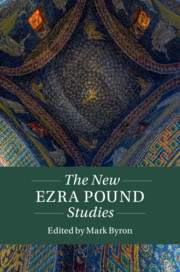Book contents
- The New Ezra Pound Studies
- Twenty-First-Century Critical Revisions
- The New Ezra Pound Studies
- Copyright page
- Contents
- Notes on Contributors
- Key to Abbreviations
- Editor’s Introduction
- Part I Pound’s Texts
- Chapter 1 Classical Literature
- Chapter 2 Early Medieval Philosophy and Textuality
- Chapter 3 Ezra Pound’s Pisan Cantos
- Chapter 4 ‘Scoured and Cleansed’
- Chapter 5 The Visual Field
- Chapter 6 Texts of The Cantos and Theories of Literature
- Chapter 7 Pound and Influence
- Part II Ezra Pound and Asia
- Part III Culture and Politics
- Index
- References
Chapter 4 - ‘Scoured and Cleansed’
Ezra Pound and Musical Composition
from Part I - Pound’s Texts
Published online by Cambridge University Press: 17 October 2019
- The New Ezra Pound Studies
- Twenty-First-Century Critical Revisions
- The New Ezra Pound Studies
- Copyright page
- Contents
- Notes on Contributors
- Key to Abbreviations
- Editor’s Introduction
- Part I Pound’s Texts
- Chapter 1 Classical Literature
- Chapter 2 Early Medieval Philosophy and Textuality
- Chapter 3 Ezra Pound’s Pisan Cantos
- Chapter 4 ‘Scoured and Cleansed’
- Chapter 5 The Visual Field
- Chapter 6 Texts of The Cantos and Theories of Literature
- Chapter 7 Pound and Influence
- Part II Ezra Pound and Asia
- Part III Culture and Politics
- Index
- References
Summary
What does ‘an opera of mankind’ sound like? It depends on what mankind sounds like, and what sounds the ‘prose’ prevents us from hearing. For Francois Villon, on whom Pound based his first opera, it sounded like the brothel, the street, the tavern, the sounds of ‘theft, murder, whoring, and praying’ and the rhythms of everyday language. It is of no small importance that Pound’s primary musical curator is R. Murray Schafer, the Canadian composer who edited Ezra Pound and Music (1977), and who helped Pound prepare Le Testament for a revival radio performance. In The Soundscape (1993), Schafer reads many of the sounds in Pound’s Cantos – the sea, the woodcutter and the machine. In establishing a new cultural-scientific-aesthetic ‘interdiscipline’ of soundscape design, Schafer found that Pound, for whom all disciplines were interdisciplines, exemplified this tendency in poetry.
Keywords
- Type
- Chapter
- Information
- The New Ezra Pound Studies , pp. 57 - 71Publisher: Cambridge University PressPrint publication year: 2019



